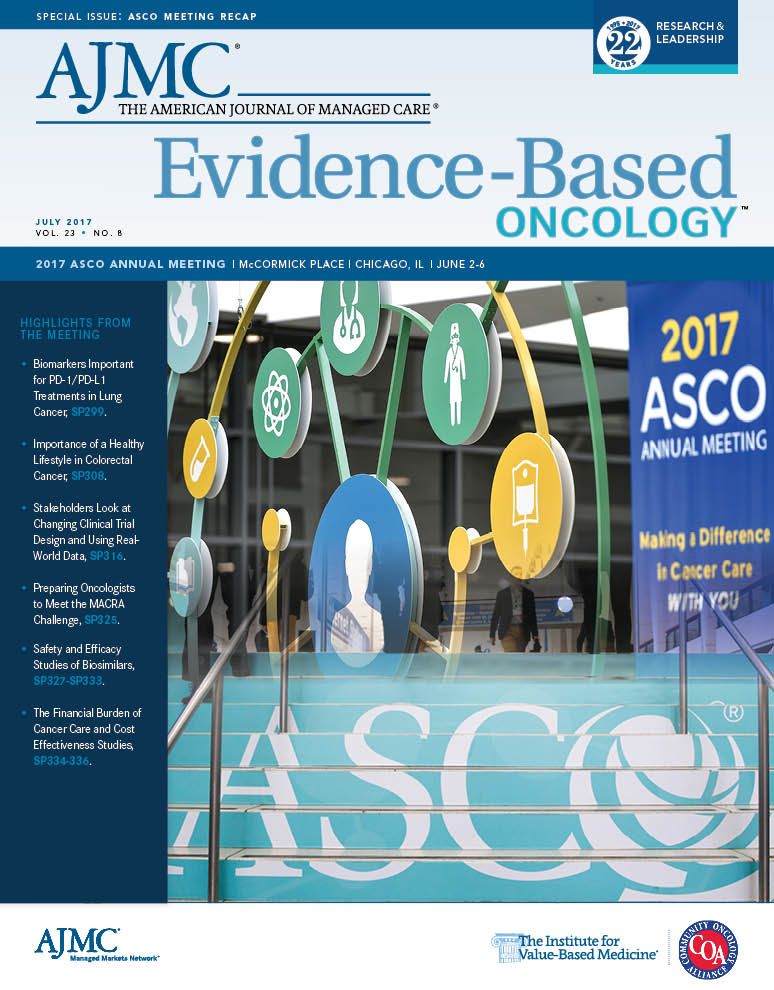- Center on Health Equity & Access
- Clinical
- Health Care Cost
- Health Care Delivery
- Insurance
- Policy
- Technology
- Value-Based Care
Trabectedin and Lurbinectedin Effective in BRCA2-Associated Metastatic Breast Cancer
An interim analysis of two phase 2 trials, reported in a poster session at the 2017 American Society of Clinical Oncology Annual Meeting, has found that trabectedin and lurinectedin demonstrated remarkable activity as single agents in BRCA2-associated metastatic breast cancer.
AN INTERIM ANALYSIS OF TWO
phase 2 trials has found that trabectedin and lurinectedin demonstrated remarkable activity as single agents in BRCA2-associated metastatic breast cancer, with 33% clinical response with trabectedin and 61% with lurbinectedin. Results of the analysis were reported in a poster session at the 2017 American Society of Clinical Oncology Annual Meeting.1
BRCA1- and BRCA2-associated breast cancers share homologous recombination deficiency, but also play independent and potentially actionable roles. Novel drugs with innovative mechanisms of action, which lack cross-resistance with other commonly used agents, are needed for treating this subgroup of patients with metastatic breast cancer.
Trabectedin and its analog, lurbinectedin, have demonstrated activity in BRCA1- and BRCA2-associated metastatic breast cancer. The present study sought to determine any difference in activity between these agents in BRCA1 vs BRCA2 mutation carriers. Both safety and efficacy of single-agent trabectedin and lurbinectedin were analyzed in two separate phase 2 trials.
Trabectedin (Yondelis) is a multimodal, synthetically produced antitumor agent, originally derived from the sea squirt, Ecteinascidia turbinata. The drug exerts its activity by targeting the transcriptional machinery and impairing DNA repair. It is approved in close to 80 countries in North America, Europe, South America, and Asia for advanced soft tissue sarcomas as a single agent and for relapsed ovarian cancer in combination with doxorubicin hydrochloride liposome injection in the European Union.2
Lurbinectedin (Zepsyre) is an inhibitor of RNA polymerase II—an essential component of the transcription process that is overactivated in tumors with transcription addiction. The antitumor efficacy of lurbinectedin is being investigated in various types of solid tumors, including platinum-resistant ovarian cancer (phase 3 trial), BRCA1- and BRCA2-associated metastatic breast cancer (phase 2 trial), and small-cell lung cancer (phase 3 trial).2
Eighty-eight patients were evaluated in the present trial: 34 received trabectedin and 54 lurbinectedin. The median age was 46 years and 43 years, respectively. Patients who received trabectedin had received a median (range) of 4 (1-10) lines of chemotherapy. Those who received lurbinectedin had received 2 (0-5) lines. Trabectedin was given at a dose of 1.3 mg/m2 on day 1, every 3 weeks. The 7 mg full dose of lurbinectedin was given at 3.5 mg/m2 on day 1, every 3 weeks.
Clinical responses were seen in the 2 trials and were higher in BRCA2 than in BRCA1 carriers (trabectedin 33% vs 9% and lurbinectedin 61% vs 26%, respectively). The main adverse event was myelosuppression (grade 3/4 neutropenia/thrombocytopenia/febrile neutropenia: trabectedin, 62.1%/24.3%/10.8%, lurbinectedin, 66.7%/20.4%/20.4%).
Nonhematological toxicity was mostly grade 1/2 fatigue, nausea/vomiting, and high transaminases. Grade 3/4 nonhematological toxicity was reported in 40.5% of patients who received trabectedin and 18.5% of those who received lurbinectedin.
The trial of lurbinectedin began in 2012 and final data for analysis of the primary outcome measure will be collected in December 2018. The primary outcome measure is overall response rate over a minimum of 10-12 months if results are negative and up to 26 to 28 months if targeted enrollment is completed.2
Overall response rate is defined as the percentage of patients with confirmed response (complete or partial response per Response Evaluation Criteria in Solid Tumors v1.1.).3 Secondary outcome measures are progression-free survival (PFS) and overall survival (OS) over 36 months.
PFS is defined as the duration from first infusion to progressive disease, death due to any cause, or last tumor evaluation. OS rate at 1 year is defined as the estimated probability of patients to remain alive at 1 year. OS is defined as the duration from first infusion to death or last contact.3
The investigators concluded that trabectedin and lurbinectedin demonstrated remarkable activity as single agents against BRCA2-associated metastatic breast cancer in this interim analysis. The finding warrants further investigation. A potential mechanistic rationale is the role of lurbinectedin and that of BRCA2 in transcription. Safety was acceptable and manageable in both studies.REFERENCES
1. Gelpi JB, Lubinski JA, Arun B, et al. Antitumor activity of trabectedin and lurbinectedin in germline BRCA2 carriers with metastatic breast cancer (MBC) as compared to BRCA1 carriers: Analysis of two phase II trials. J Clin Oncol. 2017;35(suppl; abst 574) abstracts.asco.org/199/AbstView_199_186634.html.
2. PharmaMar announces encouraging results in clinical trials of lurbinectedin in endometrial and breast cancers [press release]. Madrid, Spain: PharmaMar; June 13, 2017. pharmamar.com. https://www.pharmamar.com/wp-content/ uploads/2017/06/PR-PharmaMar_Post-ASCO.pdf. Accessed June 30, 2017.
3. A phase II clinical trial of PM01183 in BRCA 1/2-associated or unselected metastatic breast cancer. ClinicalTrials.gov website. clinicaltrials.gov/ct2/show/NCT01525589. Updated January 5, 2017. Accessed June 30, 2017.


